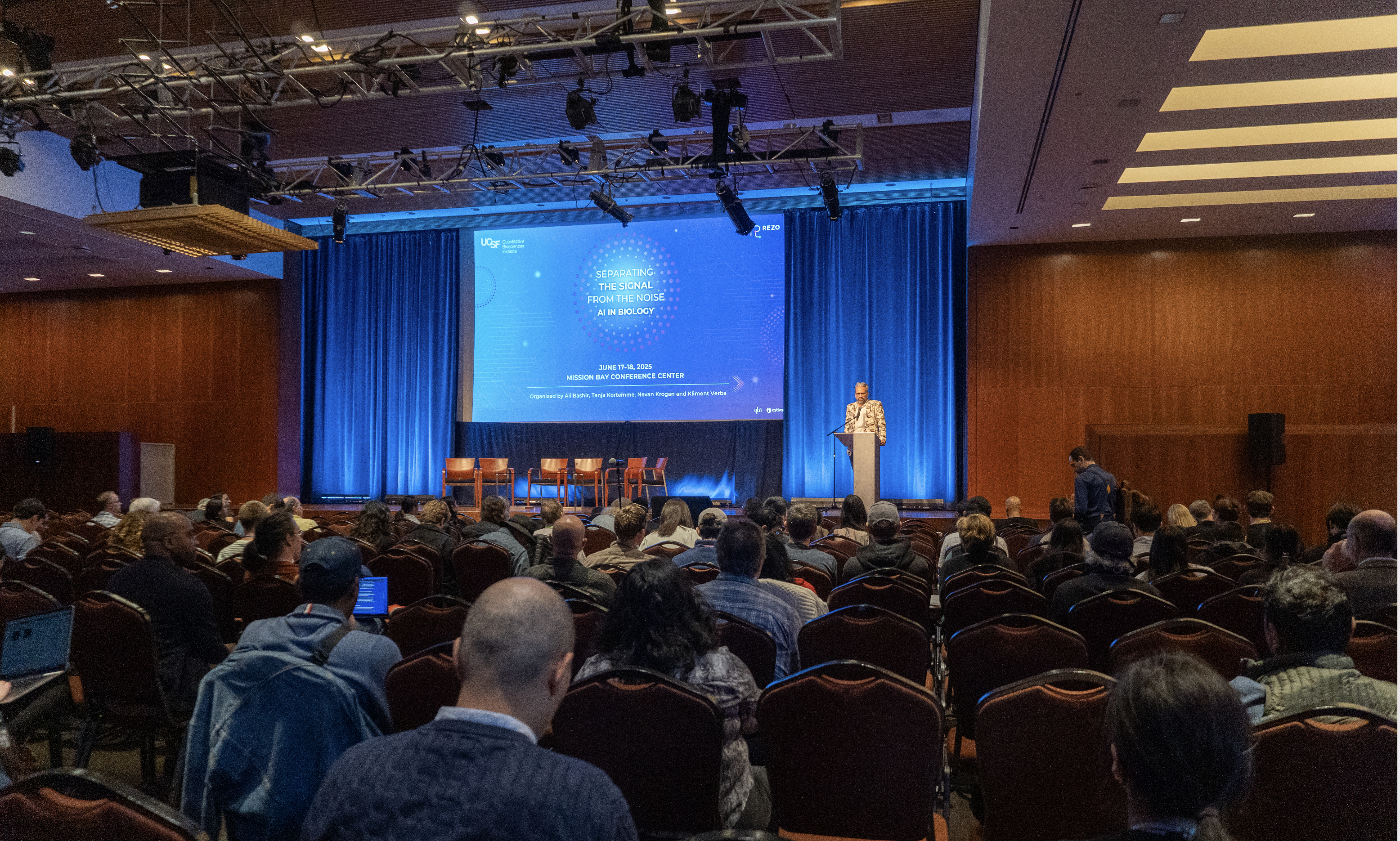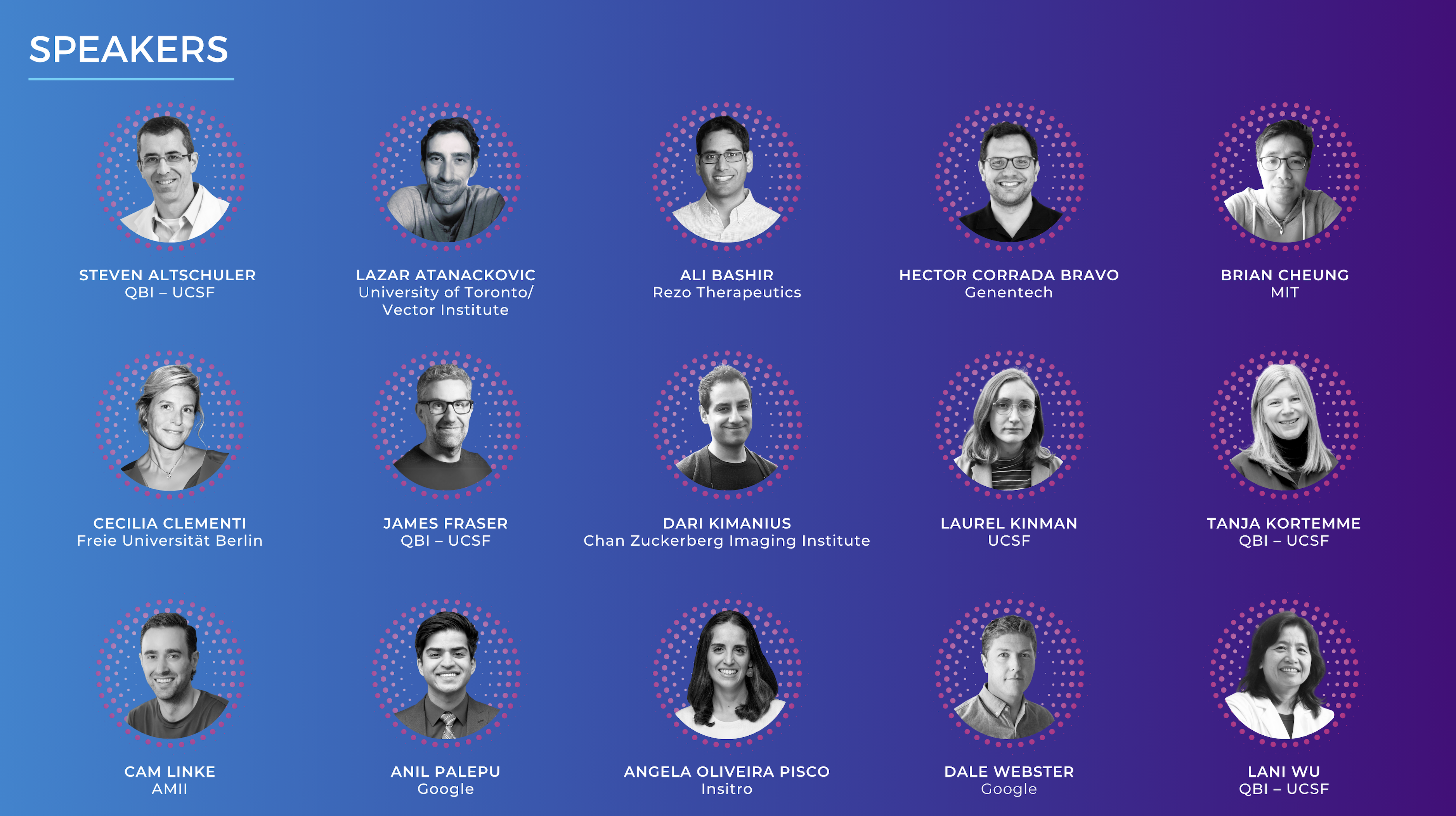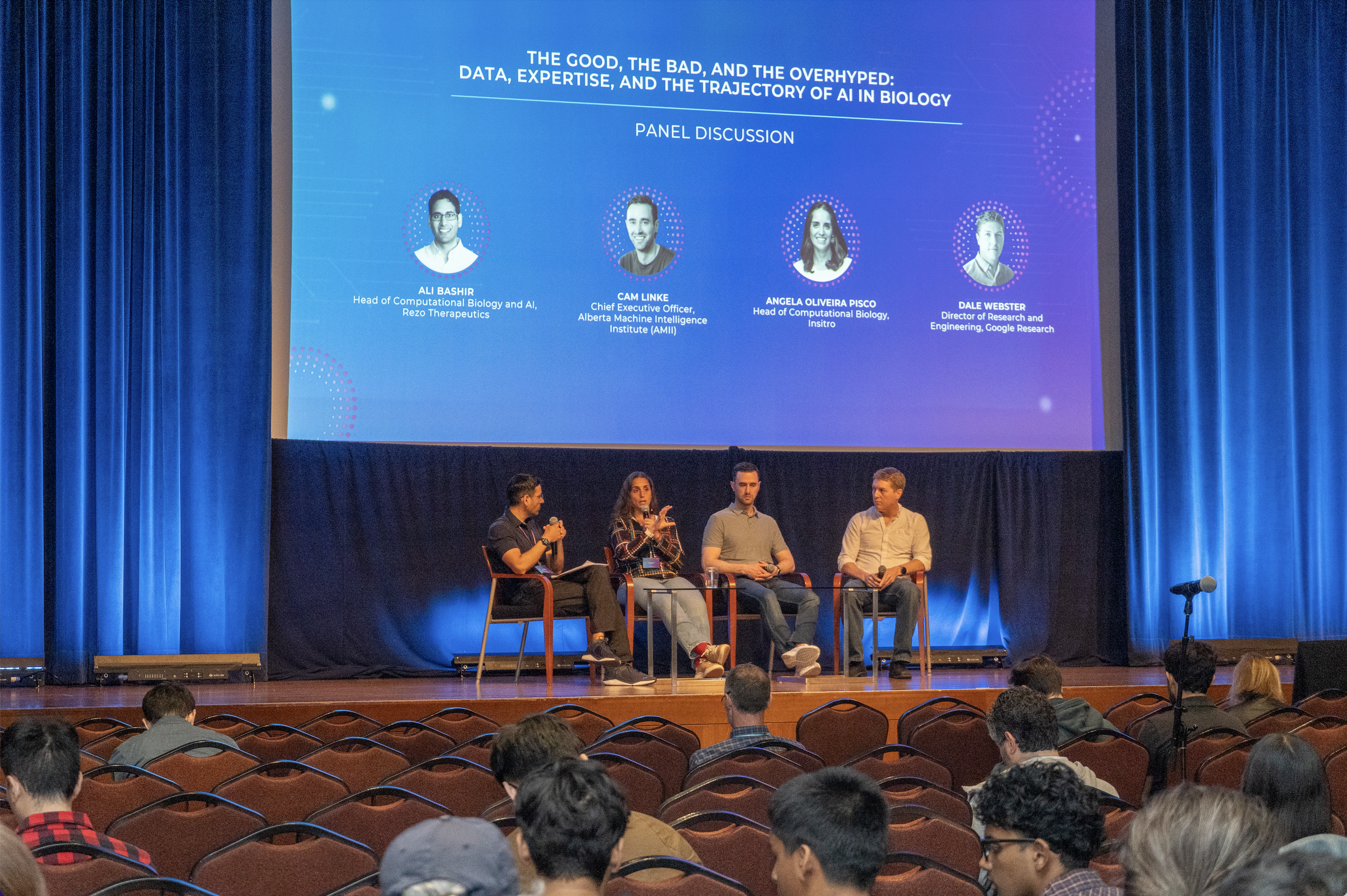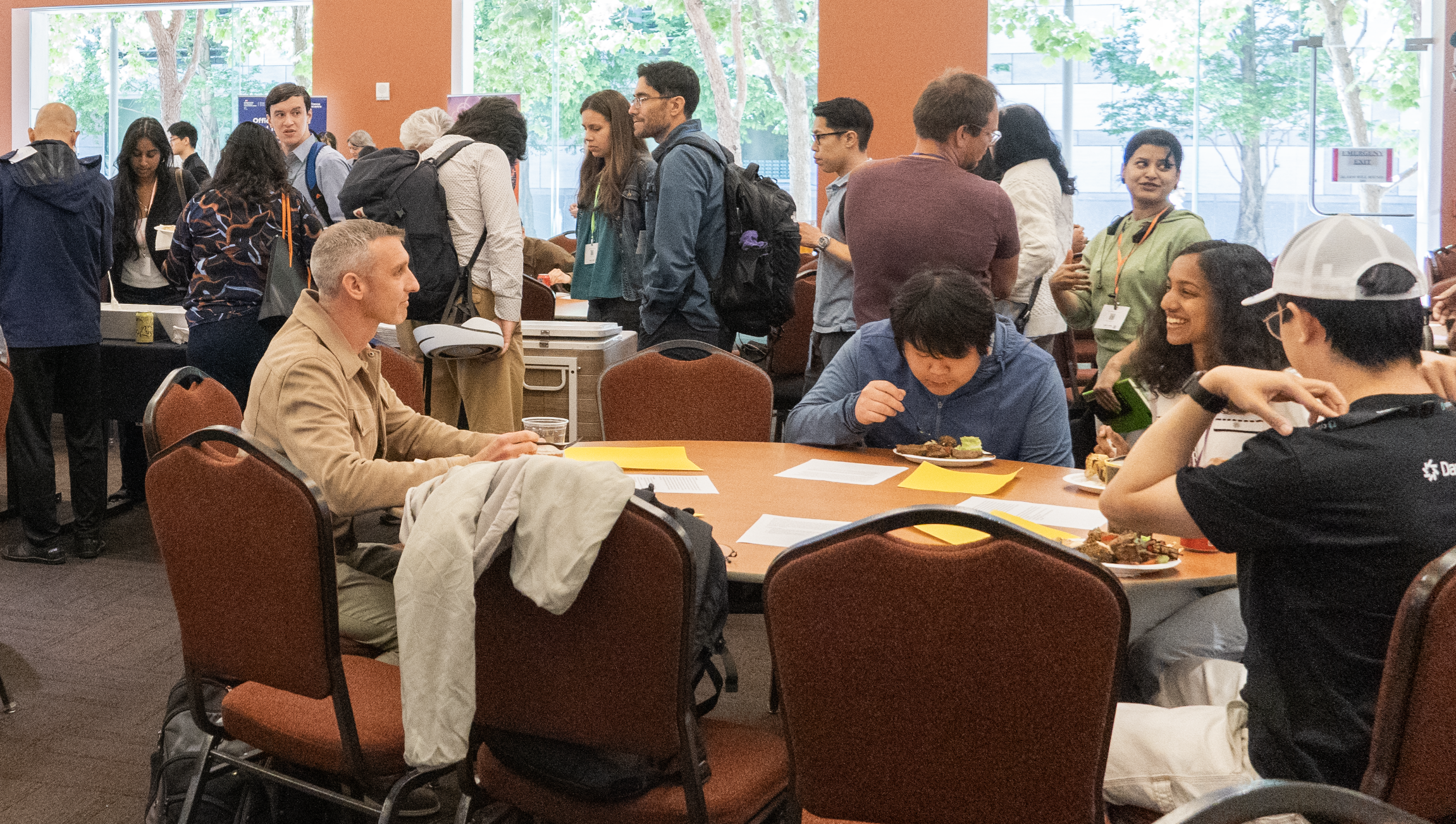
How can artificial intelligence transform biology? That was the question at the heart of “Separating the Signal from the Noise: AI in Biology,” a two-day symposium hosted at UCSF by the Quantitative Biosciences Institute (QBI) in partnership with Rezo Therapeutics. From June 17–18, 2025, leading scientists, engineers, and computational biologists from academia, biotech, and industry came together to explore how AI is reshaping the way we understand disease and design the next generation of therapeutics.
Unpacking the Biology-AI Interface
The symposium featured a powerhouse lineup of speakers who offered wide-ranging perspectives on the current and future potential of AI in biological discovery. Topics spanned from protein-protein interaction networks and large language models, to cryo-electron tomography, spatial proteomics, and machine learning for high-dimensional phenotyping.

Talks by speakers like Ali Bashir (Rezo Therapeutics), Cecilia Clementi (Freie Universität Berlin), Angela Pisco (Insitro), Brian Cheung (MIT), and Anil Palepu (Google Health) highlighted how AI can identify hidden structures in complex data, guide drug design, and even enable real-time conversational tools for healthcare delivery. Speakers emphasized not only technical innovation, but also the conceptual leap of integrating network biology, structural data, and predictive modeling to accelerate precision medicine.
A Community in Conversation
Beyond the talks, the symposium fostered meaningful interaction through poster sessions, panel discussions, and informal networking moments. Poster presenters, including early-career scientists and graduate students, shared exciting work across computational biology, protein design, and AI-driven therapeutics. Whether in structured sessions or spontaneous hallway conversations, the event provided fertile ground for new connections and idea generation.

During the panel discussion titled “The Good, the Bad, and the Overhyped: Data, Expertise, and the Trajectory of AI in Biology,” moderated by Ali Bashir (Rezo Therapeutics) and introduced by UCSF Innovation Ventures. Panelists Dale Webster (Google Health), Angela Pisco (Insitro), and Cam Linke (Alberta Machine Intelligence Institute) dove into some of the most pressing challenges facing the AI-biology interface today. The conversation centered on the value of data, with agreement that while publicly available datasets have fueled recent innovation, the real breakthroughs will come from targeted, proprietary data generation that is thoughtfully designed to inform disease models and therapeutic development. Angela noted that at Insitro, success depends on curating multimodal datasets tailored to specific contexts like ALS, while Dale emphasized that even at Google, data remains a limiting factor in many health applications. Cam added that the true bottleneck may not be data generation itself, but rather the compute power and collaborative frameworks needed to unlock the vast amount of untapped data already sitting in individual labs.

The panel also tackled the role of big tech vs. academic and biotech players, how to define differentiated projects in a saturated AI landscape, and the essential skillsets for future scientists; with adaptability, collaboration, and domain fluency named as critical. As the field moves fast, panelists stressed the importance of not just knowing how to use the tools, but how to ask the right questions and interpret results meaningfully. When asked about overhyped vs. underhyped areas, the group was candid: predicting unseen biology with current models is still largely speculative, while the true (and underappreciated) power of AI may lie in incremental improvements and rigorous evaluation that slightly, but meaningfully, boost the probability of success in drug discovery.
The panel closed on a visionary note with bold predictions for the next 5–10 years: from reinforcement learning deeply embedded in biological research, to AI systems that can dynamically identify the most relevant data to generate, to a future where healthcare operates with the responsiveness and learning capacity of Google Search. In a field buzzing with excitement, the message was clear: thoughtful, interdisciplinary collaboration is what will separate the signal from the noise.
Brainstorming Breakouts: Sparking Future Directions
One of the most dynamic moments of the symposium was the collaborative brainstorming session, where participants split into interdisciplinary groups to tackle key challenges across AI-driven drug discovery, protein design, systems biology, and structural biology. Each group explored provocative questions from whether experimental structural biology remains necessary in the era of predictive AI, to how to scale high-content imaging workflows, and what stands between today’s tools and fully automated drug discovery pipelines. Discussions highlighted both optimism and caution, with common themes emerging: the urgent need for interpretable AI models, improved data integration and standardization, and stronger cross-sector collaboration. Whether debating the limits of language models in clinical applications or envisioning autonomous AI systems designing next-gen experiments, the session underscored the community’s appetite for ambitious, foundational work and its commitment to addressing the sociotechnical and ethical complexities of AI in biology.

Reflections: What Set This Apart and What’s Next?
One recurring theme throughout the event was the balance between innovation and interpretation: AI is only as powerful as the questions we ask of it and the validation we apply to its outputs. Speakers called attention to the need for experimental grounding, biological relevance, and ethical deployment of AI tools in medicine.
The symposium also demonstrated the unique strength of academic-industry partnerships, with Rezo and QBI jointly showcasing how collaborative ecosystems can fast-track the translation of basic science into real-world therapies. As QBI Director Nevan Krogan noted, “Bringing together people from different disciplines, biologists, engineers, physicists, data scientists, is key. This kind of logic will have a big impact in virtually any area of society.”
At QBI, we’re excited to build on the momentum from this year’s symposium and continue fostering a global community at the intersection of AI and biology.
We welcome you to view the event photo gallery.
This event was dedicated to the memory of Atul Butte, Priscilla Chan and Mark Zuckerberg Distinguished Professor of Pediatrics, Bioengineering and Therapeutic Sciences, and Epidemiology and Biostatistics; Inaugural Director of the Bakar Computational Health Sciences Institute; Chief Data Scientist for the University of California Health System.